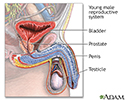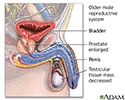Aging changes in the male reproductive system
Andropause; Male reproductive changes
Aging changes in the male reproductive system may include changes in testicular tissue, sperm production, and erectile function. These changes usually occur gradually.
Information
Unlike women, men do not experience a major, rapid (over several months) change in fertility as they age (like menopause). Instead, changes occur gradually during a process that some people call andropause.
Aging changes in the male reproductive system occur primarily in the testes . Testicular tissue mass decreases. The level of the male sex hormone, testosterone decreases gradually. There may be problems getting an erection. This is a general slowing, instead of a complete lack of function.
Testes
The testes are 2 egg-shaped male reproductive organs located in the scrotum. They produce sperm and the male hormone, testosterone.

Testosterone
A testosterone test measures the amount of the male hormone, testosterone, in the blood. Both men and women produce this hormone. The test described...
FERTILITY
The tubes that carry sperm may become less elastic (a process called sclerosis). The testes continue to produce sperm, but the rate of sperm cell production slows. The epididymis, seminal vesicles, and prostate gland lose some of their surface cells. But they continue to produce the fluid that helps carry sperm.
URINARY FUNCTION
The prostate gland enlarges with age as some of the prostate tissue is replaced with a scar like tissue. This condition, called benign prostatic hyperplasia (BPH), affects about 50% of men. BPH may cause problems with slowed urination and ejaculation.
Benign prostatic hyperplasia
The prostate is a gland that produces the fluid that carries sperm during ejaculation. The prostate gland surrounds the urethra, the tube through wh...

In both men and women, reproductive system changes are closely related to changes in the urinary system.
EFFECT OF CHANGES
Fertility varies from man to man. Age does not predict male fertility. Prostate function does not affect fertility. A man can father children, even if his prostate gland has been removed. Some fairly old men can (and do) father children.
The volume of fluid ejaculated usually remains the same, but there are fewer living sperm in the fluid.
Some men may have a lower sex drive (libido). Sexual responses may become slower and less intense. This may be related to decreased testosterone level. It may also result from psychological or social changes due to aging (such as the lack of a willing partner), illness, chronic conditions, or medicines.
Chronic
Chronic refers to something that continues over an extended period of time. A chronic condition is usually long-lasting and does not easily or quick...

Aging by itself does not prevent a man from being able to enjoy sexual relationships.
COMMON PROBLEMS
Erectile dysfunction (ED) may be a concern for aging men. It is normal for erections to occur less often than when a man was younger. Aging men are often less able to have repeated ejaculations.
ED is most often the result of a medical problem, rather than simple aging. 90% of ED is believed to be caused by a medical problem instead of a psychological problem.
Medicines (such as those used to treat hypertension and certain other conditions) can prevent a man from getting or keeping enough of an erection for intercourse. Disorders, such as diabetes , can also cause ED.
Hypertension
Blood pressure is a measurement of the force exerted against the walls of your arteries as your heart pumps blood to your body. Hypertension is the ...

Diabetes
Diabetes is a chronic disease in which the body cannot regulate the amount of sugar in the blood.

ED that is caused by medicines or illness is often successfully treated. Talk to your primary health care provider or a urologist if you are concerned about this condition.
BPH may eventually interfere with urination. The enlarged prostate partially blocks the tube that drains the bladder (urethra). Changes in the prostate gland make older men more likely to have urinary tract infections .
Urinary tract infections
A urinary tract infection, or UTI, is an infection of the urinary tract. The infection can occur at different points in the urinary tract, including...

Urine may back up into the kidneys (vesicoureteral reflux) if the bladder is not fully drained. If this is not treated, it can eventually lead to kidney failure .
Kidney failure
Acute kidney failure is the rapid (less than 2 days) loss of your kidneys' ability to remove waste and help balance fluids and electrolytes in your b...

Prostate gland infections or inflammation ( prostatitis ) may also occur.
Prostatitis
Prostatitis is swelling of the prostate gland. Prostate tissue becomes inflamed. This problem can be caused by an infection with bacteria. Acute pr...

Prostate cancer becomes more likely as men age. It is one of the most common causes of cancer death in men. Bladder cancer also becomes more common with age. Testicular cancers are possible, but these occur more often in younger men.
Prostate cancer
Prostate cancer is cancer that starts in the prostate gland. The prostate is a small, walnut-shaped structure that makes up part of a man's reproduc...

Bladder cancer
Bladder cancer is a cancer that starts in the bladder. The bladder is the body part that holds and releases urine. It is in the center of the lower...

Testicular cancers
Testicular cancer is cancer that starts in the testicles. The testicles are the male reproductive glands located in the scrotum.

PREVENTION
Many physical age-related changes, such as prostate enlargement or testicular atrophy, are not preventable. Getting treated for health disorders such as high blood pressure and diabetes may prevent problems with urinary and sexual function.
Changes in sexual response are most often related to factors other than simple aging. Older men are more likely to have good sex if they continue to be sexually active during middle age.
RELATED TOPICS
-
Aging changes in hormone production
Aging changes in hormone production
The endocrine system is made up of organs and tissues that produce hormones. Hormones are natural chemicals produced in one location, released into ...
 ImageRead Article Now Book Mark Article
ImageRead Article Now Book Mark Article -
Aging changes in organs, tissues, and cells
Aging changes in organs, tissues, and c...
All vital organs begin to lose some function as you age during adulthood. Aging changes occur in all of the body's cells, tissues, and organs, and t...
 ImageRead Article Now Book Mark Article
ImageRead Article Now Book Mark Article -
Aging changes in the kidneys
Aging changes in the kidneys
The kidneys filter the blood and help remove wastes and extra fluid from the body. The kidneys also help control the body's chemical balance. The k...
 ImageRead Article Now Book Mark Article
ImageRead Article Now Book Mark Article
References
Lamberts SWJ, van den Beld AW. Endocrinology and aging. In: Melmed S, Polonsky KS, Larsen PR, Kronenberg HM, eds. Williams Textbook of Endocrinology . 13th ed. Philadelphia, PA: Elsevier; 2016:chap 27.
Walston JD. Common clinical sequelae of aging. In: Goldman L, Schafer AI, eds. Goldman-Cecil Medicine . 25th ed. Philadelphia, PA: Elsevier Saunders; 2016:chap 25.
-
Young male reproductive system - illustration
The main function of the male reproductive system is the production of viable sperm in sufficient quantities to increase the likelihood of fertilization of the female egg.
Young male reproductive system
illustration
-
Aged male reproductive system - illustration
The aged male reproductive system may not be as effective in producing viable sperm.
Aged male reproductive system
illustration
-
Young male reproductive system - illustration
The main function of the male reproductive system is the production of viable sperm in sufficient quantities to increase the likelihood of fertilization of the female egg.
Young male reproductive system
illustration
-
Aged male reproductive system - illustration
The aged male reproductive system may not be as effective in producing viable sperm.
Aged male reproductive system
illustration
-
Menopause
(In-Depth)
-
Benign prostatic hyperplasia
(In-Depth)
-
Alcohol use disorders
(In-Depth)
Review Date: 8/22/2016
Reviewed By: Laura J. Martin, MD, MPH, ABIM Board Certified in Internal Medicine and Hospice and Palliative Medicine, Atlanta, GA. Also reviewed by David Zieve, MD, MHA, Isla Ogilvie, PhD, and the A.D.A.M. Editorial team.


